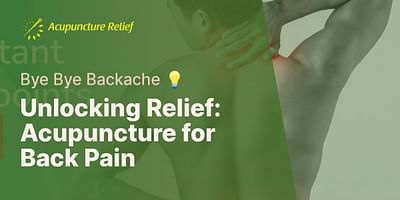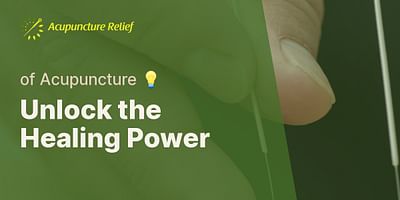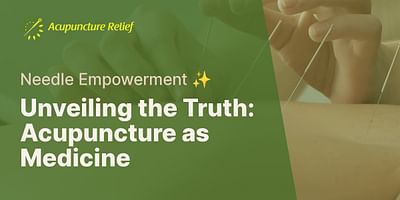Dr. Robert Kim is a medical doctor who specializes in pain management. He became interested in acupuncture as a complementary therapy to conventional medicine. Dr. Kim has a medical degree from Harvard Medical School and has completed an acupuncture certification program.
I understand that acupuncture may not be for everyone, and you may be looking for alternative treatments that can provide similar benefits. Fortunately, there are several alternative therapies that can be effective in addressing various health concerns. While these alternatives may not involve the use of needles like acupuncture, they can still offer natural and non-invasive approaches to healing. Let's explore some of these alternative treatments:
1. Acupressure: Acupressure is a technique that involves applying pressure to specific points on the body, similar to acupuncture. By stimulating these points, acupressure aims to promote the flow of energy and restore balance. This therapy can be performed by a trained practitioner or even self-administered with proper guidance.
2. Herbal Medicine: Herbal medicine has been used for centuries to treat various ailments. It involves the use of plants and their extracts to promote healing and restore health. Herbal remedies can be taken orally, applied topically, or used in the form of teas, tinctures, or capsules. It is important to consult with a qualified herbalist or naturopath to ensure proper dosage and safety.
3. Massage Therapy: Massage therapy is a hands-on technique that involves manipulating the soft tissues of the body to promote relaxation, relieve muscle tension, and improve circulation. Different massage techniques, such as Swedish massage, deep tissue massage, and Thai massage, can target specific areas of concern and provide therapeutic benefits.
4. Chiropractic Care: Chiropractic care focuses on the alignment of the spine and nervous system to promote overall health and well-being. Chiropractors use manual adjustments and other techniques to correct misalignments, relieve pain, and improve function. This alternative therapy is particularly effective for musculoskeletal conditions and can complement other treatments.
5. Traditional Chinese Medicine (TCM): TCM encompasses a range of therapies, including acupuncture, herbal medicine, dietary therapy, and mind-body practices like tai chi and qigong. While acupuncture is a prominent component of TCM, other modalities within this holistic system can be explored to address specific health concerns.
6. Homeopathy: Homeopathy is a system of medicine that uses highly diluted substances to stimulate the body's natural healing response. It is based on the principle of "like cures like," where a substance that causes symptoms in a healthy person is used to treat similar symptoms in a sick person. Homeopathic remedies are available in various forms, including pellets, tablets, and liquids.
Remember, it's important to consult with qualified practitioners when considering alternative treatments. They can assess your specific needs and provide personalized recommendations. Additionally, it's always a good idea to inform your primary healthcare provider about any alternative therapies you are considering, as they can help ensure a comprehensive and integrated approach to your health.
While acupuncture is a highly effective therapy, these alternative treatments can offer valuable options for those seeking non-invasive, natural, and cost-effective alternatives. Explore these options, and find the approach that resonates with you and supports your overall well-being.
















